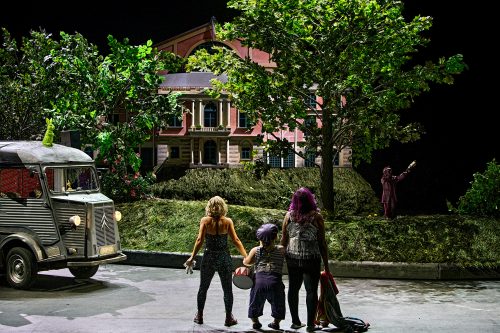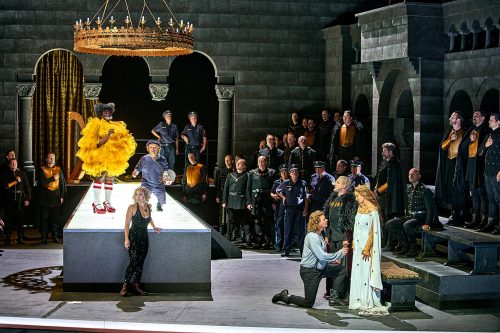
 Germany Bayreuth Competition 2024 [4] – Wagner, Tannhäuser: Soloists, Bayreuth Competition Refrain and Orchestra / Nathalie Stutzmann (conductor). Festspielhaus, Bayreuth, 4.8.2023. (MB)
Germany Bayreuth Competition 2024 [4] – Wagner, Tannhäuser: Soloists, Bayreuth Competition Refrain and Orchestra / Nathalie Stutzmann (conductor). Festspielhaus, Bayreuth, 4.8.2023. (MB)

Manufacturing:
Director – Tobias Kratzer
Set designs – Rainer Sellaier
Lighting – Reinhard Traub
Video – Manuel Braun
Dramaturgy – Konrad Kuhn
Refrain director – Eberhard Friedrich
Forged:
Hermann, Landgrave of Thuringia – Günther Groissböck
Tannhäuser – Klaus Florian Vogt
Wolfram von Eschenbach – Markus Eiche
Walther von der Vogelweide – Siyabonga Maqungo
Biterolf – Olafur Sigurdarson
Heinrich der Schreiber – Martin Koch
Reinmar von Zweter – Jens-Erik Aasbø
Elisabeth – Elisabeth Teige
Venus / Web page – Irene Roberts
Younger Shepherd – Flurina Stöckl
Le Gateau Chocolat – Le Gateau Chocolat
Oskar – Manni Laudenbach
Pages – Simone Lerch, Laura Margaret Smith, Annette Gutjahr
Adieu or au revoir, I requested myself when leaving the Festspielhaus, but in addition every so often throughout this efficiency of Tannhäuser. It won’t, I hope, be adieu to the Bayreuth Competition. My years of attendance pale compared to these of many, however common visits have change into a part of my musical, mental, and certainly social life, and I must be sorry to see that come to an finish. However would it not be to Tobias Kratzer’s manufacturing, and to the characters it has not solely portrayed and explored however created, with lives, personalities, and prospects of their very own? The closest parallel that offered itself to me, maybe mockingly, was that of Frank Castorf’s Ring (article right here), which I additionally noticed right here 3 times, and to which by the top I had change into fairly connected. Even now, I generally surprise fancifully no matter turned of Nadine Weissmann’s Erda, following Wotan’s brutal dismissal of her at (Al-)Exanderplatz. Someway, ridiculous although this may increasingly sound, I ought to prefer to know that, a bit like Sue Ellen in Dallas, she battled via. For Kratzer’s equally basic – much less controversially so – staging, time will inform. 2024 was scheduled to be its remaining outing, however there are believable rumours that Le Gateau Chocolat and the gang will take the stage another time two summers from now, when Bayreuth is because of give all works from The Flying Dutchman on, including Rienzi for the primary time within the Festspielhaus, for the Competition’s sesquicentenary.
As clever as it’s entertaining (not essentially a phrase one immediately associates with this opera), Kratzer’s metatheatrical, Ariadne-like Tannhäuser thus turned all of the extra shifting for me on this event, although I assume which will even be attributed to a slight shift in tone. At its coronary heart – it has an enormous coronary heart – lies the opposition, devoted to Wagner’s personal binaries and makes an attempt to bridge them, between the world of the Wartburg and that of the Venusberg: the previous as offered at Bayreuth, the latter a defiantly different, joyous troupe made up of Tannhäuser, his lover Venus, and two fellow artists, the fabulous Le Gateau Chocolat (as herself) and the enchanting Oskar (as in Günter Grass’s Oskar Matzerath, performed by Manni Laudenbach with tin drum). They too make artwork; they too will be uncompromising; however in a different way, as in life, and in that they’re fairly unapologetic. The Overture – for higher or worse, that is the Dresden Tannhäuser – exhibits via a combination of movie and staging our gamers on the street, working out of meals and gas, having to make an emergency cease at a service station to replenish provides, solely to be (nearly) caught by a policeman. Venus, to the horror of the others, places her foot down in a hit-and-run incident, occasioning Tannhäuser’s soar from the van and departure from the band. A stunning contact this 12 months, was early on to have Oskar, lump in his throat, drink a shot in reminiscence of Stephen Gould, the manufacturing’s first Tannhäuser.
Discovered by a passing bicycle owner (the Shepherd), Tannhäuser proceeds to rejoin his former singers on the Festspielhügel, the Competition viewers making its method round their discussions, with the intention to be current on the efficiency. As the primary act is drawing to an in depth, Venus, Le Gateau Chocolat, and Oskar make their strategy to the Inexperienced Hill to win Tannhäuser again. A lot of the particular viewers – all who want – then make their method all the way down to the pond on the foot of the really present hill, for the cabaret present they’ve devised, superbly compered by Le Gateau Chocolat, who attracts proceedings (her personal rendition of ‘Dich teure Halle’ included) to an in depth with a name for Bayreuth to return out of the closet and show the Progress Satisfaction Flag, a poignant and obligatory name for queer liberation within the age of JD Vance and JK Rowling.

For the second act, we transfer contained in the Festspielhaus/conventional Wartburg, video taking us backstage, each for preparations (with nice, detailed work each by the stay movie crew and members of the refrain) and for occasions for which the home is something however ready. In specific homage to the younger German Wagner, members of the troupe invade the temple of bourgeois artwork, reminding us who Wagner actually was and what he stood for with the banner unfurled from the storied balcony on the entrance of the home: quoting the composer’s torrential revolutionary catechism, Die Revolution, of 1849: ‘Frei im Wollen/Frei im Thun/Frei im Geniessen/R[ichard] W[agner]’. Freedom in need, deed, and pleasure presents an apparent, evident distinction with the professed values of the Minnesänger, as in fact Wagner proceeds to indicate within the music contest, right here crashed by our different artists, Venus pushing herself ahead as an ersatz Web page (a phrase behind within the first occasion). Ultimately, a safety guard alerts Katharina Wagner, who calls the police to arrest Tannhäuser, notably leaving a dejected, damaged troupe behind because the curtain falls.
Nobody is a winner right here, then, and definitely not Elisabeth, whom we meet once more in a desolate panorama, the van burned out, tasting soup Oskar has made. What has occurred within the meantime can largely be left to our personal creativeness, however it’s clear that the troupe has damaged up and Elisabeth has equally misplaced nearly all the pieces. If, furthermore, she has not misplaced her remaining present (or curse), she’s going to achieve this shortly to Wolfram, although solely as a result of he agrees to decorate as Tannhäuser, clown wig and all. It was clearly not a good suggestion; it doesn’t appear to have introduced them any pleasure; however within the absence of something higher in artwork or life, they felt a compulsion to take action behind the van. Solely Le Gateau Chocolat, we be taught, has made it, promoting watches from an enormous billboard above. When Tannhäuser returns, he tears to items his personal rating in despair, pages littering the stage till tales of the Papal miracle attain us. Life having in disaster supplanted artwork – this isn’t a Nietzschean aestheticism, nor was Wagner’s – we see on movie on the shut another path, which can or could not provide comfort: Tannhäuser and Elisabeth, using off within the van into the sundown. Maybe one other day, in one other world.
None of this might quantity to a lot with out dedicated performances from all involved. All principal roles aside from Venus have been performed by the identical artists I heard final 12 months. Ekaterina Gubanova will return for the ultimate two performances, however right here she was changed with Irene Roberts, who uncannily resembled her (tribute not least to these working in costumes and make-up). Her efficiency was alive, arresting, and unsentimental: very a lot what was required. Klaus Florian Vogt’s Tannhäuser was superbly sung, tirelessly acted: one other clever portrayal. Some don’t like his voice or assume it acceptable; it’s for them, as his gang may (maybe extra colourfully) inform us, to take care of it. Elisabeth Teige gave one other wonderful efficiency as her namesake, exhibiting power and subtlety in her tragedy. Markus Eiche’s typically tenor-like Wolfram provided a nice examine not solely in verbal response but in addition in wounded satisfaction. Günther Groissböck was on significantly higher kind because the Landgrave than because the earlier evening’s King Marke. Different noteworthy performances out included Siyabonga Maqungo’s sweet-toned Walther von der Vogelweide and Olafur Sigurdarson’s charismatic Biterolf.
Eberhard Friedrich drew out variegated performances from the Bayreuth Competition Refrain, phrases and which means as intelligible as these of any soloist. And while I used to be unconvinced by some gear adjustments in Nathalie Stutzmann’s conducting – on the finish of the primary act specifically – and there remained an excellent few peculiar orchestral balances, presumably born of a need to spotlight Wagner’s debt to grand opéra, appreciable progress had been produced from final 12 months. Ensemble was not excellent, however it was an excellent deal stronger than it had been within the first of the three productions I noticed and heard this 12 months. The sum of what, I feel, we could in the perfect sense name this ‘present’ proved larger and deeper than its estimable elements. Right here is to hopes for 2026.
Mark Berry


